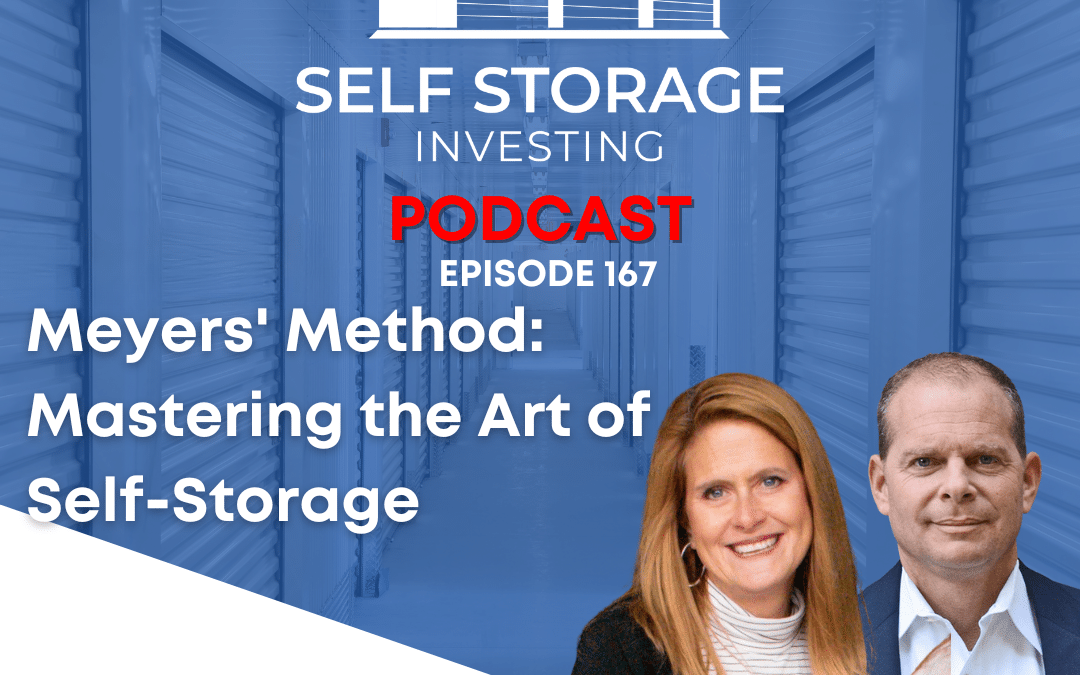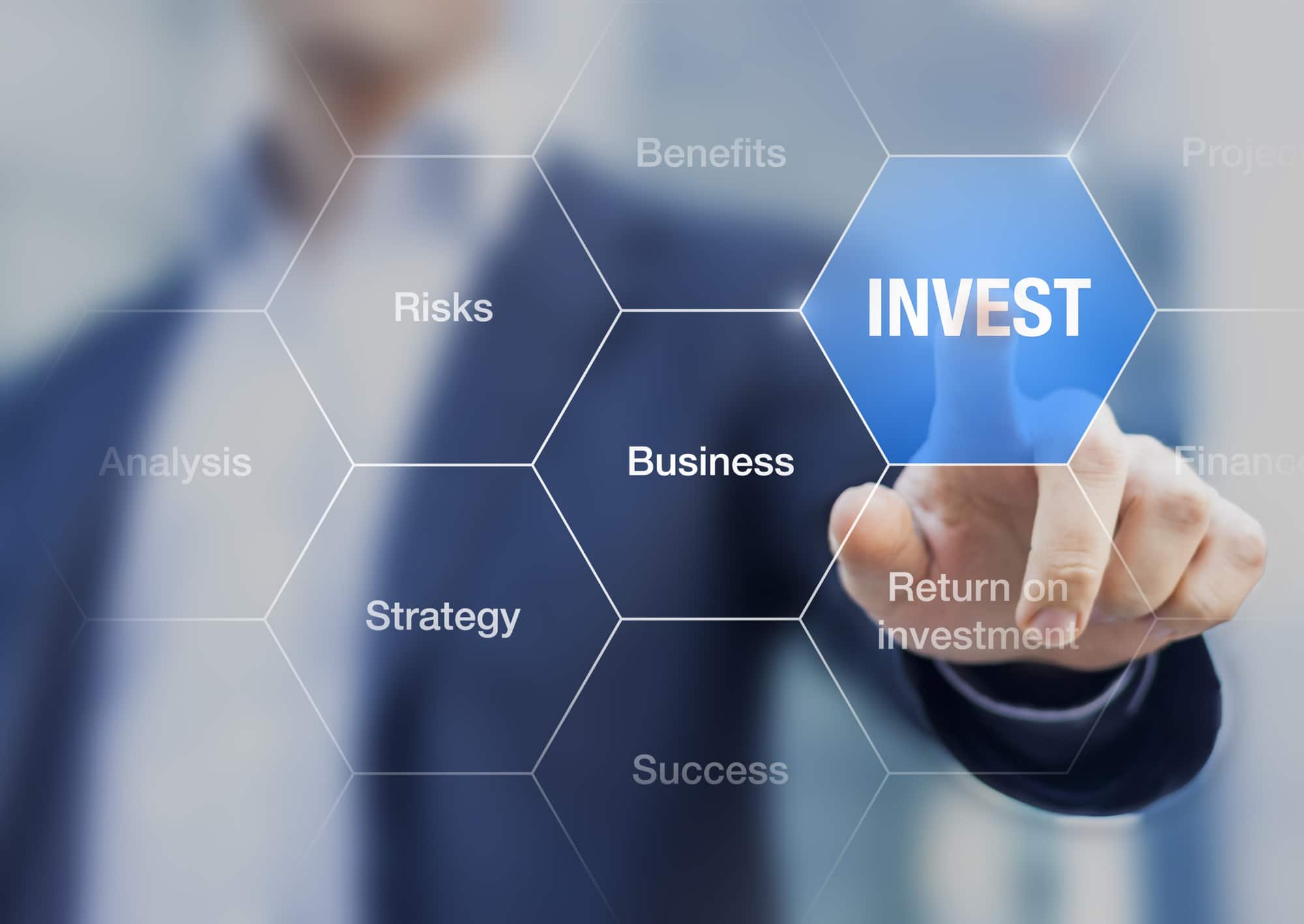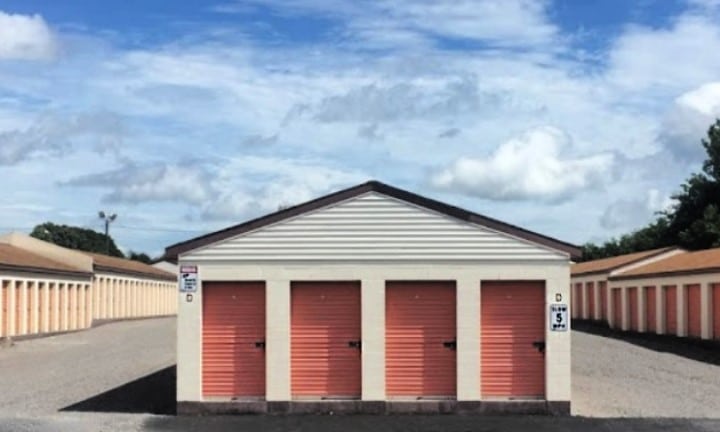The revisions to the SBA rules make it easier for borrowers to meet the 10% equity requirement for loans, allowing seller debt to count towards the full 10% equity injection.
Other changes include the acceptance of Home Equity Line of Credit (HELOC) or cash-out refinance of real property as equity, and the simplification of debt refinance.
And a newly implemented rule limits loan terms for partner buyouts to 10 years.
WHAT TO LISTEN FOR
5:18 Use of HELOC and Cash-out Refinance for Equity
6:30 Clarification of SBA 7(a) vs. 504 Loans
17:40 SBA’s New 10-year Loan Term Limit
26:21 REITs Management Approval
Leave a positive rating for this podcast with one click
CONNECT WITH GUEST ANNE MINO
Website | LinkedIn | Email
CONNECT WITH US
Website | You Tube | Facebook | X | LinkedIn | Instagram
The heart and hustle behind the Meyer’s self-storage empire.
This episode shares the personal and professional evolution of the Meyers’, from overworked landlords to self-storage magnates. Christina opens up about their initial leap of faith into the industry, while Scott details their transition into education and mentorship, shaping the country’s leading self-storage community.
The couple candidly explores the balance of business and marriage, sharing invaluable insights on partnership and conflict resolution.
Topping off their narrative, they delve into their mission-driven business model, which has not only spurred financial success but also ignited a passion for philanthropy, leaving a lasting impact on communities and setting a heartfelt example for entrepreneurs everywhere.
WHAT TO LISTEN FOR
3:22 The Road to Teaching
5:04 Family Dynamics in Business
9:39 Behind the Scenes Insights
19:48 A Future Focused on Philanthropy
Leave a positive rating for this podcast with one click
GUEST: CHRISTINA MEYERS
Website | You Tube| Facebook| X | LinkedIn | Instagram
CONNECT WITH US
Website | You Tube | Facebook | X | LinkedIn | Instagram
Follow so you never miss a NEW episode! Leave us an honest rating and review on Apple or Spotify.
Episode Transcript
Christina Meyers (00:00:00):
I had said to God, Lord, if this is what you want us to do, if you want us to be a part of this, then I just pray that you’ll make a way I really shouldn’t be spending your money right now.
Intro (00:00:18):
This is the self Storage Podcast where we share the knowledge and skills from the industry’s leading investors, developers, and operators to help you launch and grow your self storage business. Your host, Scott Myers, over the past 18 years has acquired, developed, converted and syndicated nearly 5 million square feet of self storage nationwide with the help of his incredible team@selfstorageinvesting.com, who has helped thousands of people achieve greatness in self storage.
Scott Meyers (00:00:54):
Hello everyone, and welcome back to the self Storage Podcast. I’m your host at Scott Myers with my special guest, Christina Myers, and this is a part two of our interview and the shearing of our journey and our transformation, if you will, from burnout land boards to entering the self-storage arena. And for those that had missed part one may be helpful to get a little more background and context by listening into part one, but either way, you’re flying the wall and listening to Christina and I talk about our journey and how we got into this incredible industry. And so we pick up from where we left off, and that is discussing how we got into the education side of the business, how we went from investing in self storage to getting into starting and launching the country’s first and largest self storage organization. And it didn’t really happen by design, I shouldn’t say it didn’t really, it never was on our radar.
(00:01:49):
It was nothing that we had ever anticipated. At the time I was running the central Indiana Real Estate Investors Association. I was the president of that organization and part of the board for a number of years, and Christina was very involved within the organization as well and helping me to run round tables. And we found that as we began to get more involved in cell storage, there were more folks that were talking to us and asking us about our journey and how we got started and where do you find them, how do you fund them, and all types of questions about the business. And many people were inviting me out to lunch to pick my brain, if you will. And then there were too many people asking for that. And then it got to the place where my calendar was booked with these lunches, and then people began asking me to pay for the lunches.
(00:02:34):
So he said, enough’s enough. And so we held a workshop on a Saturday and did our best to give these folks a good headstart into the business. And what we found is that it was wildly successful. And then as the head of this organization we brought into it was a ria, real estate Investor association, and there are a number of speakers that would come into the RIAs around the country on the national circuit that would get paid to sell a home study system. And then they would split the proceeds with these not-for-profit organizations like ours. And the agent for these speakers heard that we were holding these workshops and teaching people about so storage and there wasn’t anybody teaching it at the time and said, Hey, I will help you put together a presentation as well as a home study system and a product to be able to sell.
(00:03:22):
And if you’re interested, I can put you out on the road and you could go speak at some of these organizations. And that was somewhat interesting to me because I was the one who wrote the checks to these speakers when they came in and sold these home study systems at our group. And I saw that for a 90 minute speech that they were paid very well and it would be a good way to get more exposure for our group and then also for our investment group as well. And so we did, we spent a year writing a home study system and putting together a presentation in this agent put me out on the road and it was wildly successful and what he had put together and the messaging that he taught me how to present and the information had worked well. So I can’t give too much credit to myself other than the fact that we were in the business and there was nobody doing it at the time.
(00:04:12):
Then it really took off the second year, we were very busy traveling around the country and speaking it to different groups. And then that evolved into people wanting to then have us create a three day bootcamp or an academy as we called it at the time. So we created a three day bootcamp and then folks wanted mentoring and assistance and coaching to go along with that. And before we recognized that we were holding these three day events four to five times a year and offering mentoring and coaching programs and building up a staff and a team of folks. And we found that we now had two 60 hour a week jobs and that was one in investing in real estate and the second in teaching people how to invest in real estate as well. And so I’ll pause there and ask Christina, is that the way that you saw it or what would you add to the story?
Christina Meyers (00:05:04):
Yeah, I think when it all started, it was exciting and it was fun. And yet from a family standpoint, it certainly took Scott on the road and away from us more. So there was some hard pieces to that as well. But it was certainly the start of, as it began taking off, we realized once again there wasn’t anybody doing this. And at the time, people were not yet quite sure those people that were in self storage knew it was a great asset class. Those people that were not, were still a little maybe not sure of the asset class in the situation. So I think we started small purposefully, which was really good. But one thing led to another, and I think it was maybe at our very first academy that somebody said, Hey, what about mentoring? And it just hadn’t even occurred to us. We knew that was a model because we had seen it through the R we belonged to, we had seen that other speakers did that. And so we knew that was a model, but it wasn’t one of those things that we were intentionally trying to do. But one thing led to another and it led us down that path. It wasn’t long after that though, that we began homeschooling our kids so that we could go on the road with Scott because it was a lot on our family when he started traveling a lot, he really started traveling a lot. So there was good and bad, I guess.
Scott Meyers (00:06:34):
Yeah, there was never really, again, a desire to do this. It was never in the plan and really set out to do this other than it just kind of happened organically. And as we were beginning to pray about and search our own thoughts and feelings as to whether this is something that we wanted to do, we began to see ourselves the life change that occurs when people began investing in cell storage and what that meant for them and their lives. And they were seeing that same transformation that we saw and that is the hectic life and not so thankful life of the landlord and dealing with all the hassles of the tenants and toilets and trash, which really became our moniker within the education side of the business is how to invest in self storage without all the hassles of tenants and toilets and trash that we see and other forms of real estate.
(00:07:16):
And then that just kind of solidified the reason to move on and that this truly was our calling and we were being called into call it the real estate mission field to help others to achieve success and then to get out of some of the challenging situations that they were in and perform that life change. And that’s kind of what I guess drove us or at least kept us on this path when we could have stepped back or stepped out of this except the fact that we could see that we were truly being a part of and having a hand in some life change from these folks that were able to recapitalize their investment in retirement accounts where they had lost it in other asset classes or during one of the two recessions that we’ve been involved in over the years, or that they were able to bring a spouse home from worker, that they were both able to quit their jobs or whatever that meant for them, just additional walking around money or just a safety net. This truly was what self storage brings. It was really neat to be able to see how other folks were being able to just follow our processes and having somebody come alongside of them and be accountable to making that change.
Christina Meyers (00:08:29):
And I think even that very early on was when those people that we mentioned in the first part of this podcast began to come into our lives and they were so excited about it, it made us more excited about it. And it also brought those people that just truly have become family and began to bring those people into our lives, which is another whole unforeseen piece that never to us, that never occurred to us that we would have these people that truly we love. Very, very much
Scott Meyers (00:09:03):
So in the very beginning it was just you and I in these academies teaching these with me, talking about the investment part of creating the messes in you following up with the business practices and how to clean up those messes and bring some assemblance in order to the best business practices that we’ve then began teaching people. And you were clearly the star of the show. Everybody wanted to hear from Christina. So what were the questions that were asked of you and more specifically I guess from some of the other wives or significant others that you well have continued to answer and run across over the years?
Christina Meyers (00:09:39):
I think at that time I was doing a lot of the behind the scenes management. I wasn’t doing as much hands-on management, but a lot of the behind the scenes when it came to the software, when it came to corrections, when it came to bookkeeping, when it came to auctions, those types of things, I was watching that with our own facilities happen in the background. So with the academies then those are a lot of the questions that’s part of the piece that I taught people during art academies. And then yeah, those were a lot of the questions that came in. And I think for me, I learned so much hands-on by being there when people were gone and not able to be in the office. I learned in our facilities that way so much that the questions came much easier to me to be able to answer that management piece because I’d done a lot of the hands-on management piece at that point in time.
(00:10:38):
So I got a lot of those. I got a lot of the bookkeeping questions at that time. I was also teaching people to do real estate bookkeeping kind of as a side for me. And so there was a lot of those kind of questions that came through. As I said in the last one, one of the greatest questions was what did self-storage bring to you? And hands down without a hesitation, I said time because it was very different to have that time back in our lives that we didn’t have with the single family houses or apartments or things like that. So I think those were a lot of the questions that I got. I think it still continues to be one of those questions about Scott and I in business together, which we’ve kind of always done from the very beginning. So those were some of the questions I guess as well.
Scott Meyers (00:11:30):
So I remember very early on as we continued to create these different modules and improve upon the education side of the business, as we took a look at the mentoring side of the business, you had made it known. We said that if we’re going to do this, if we’re going to go heavier into this, then it can’t be like what we’ve seen and what we’ve experienced or witnessed with other real estate education programs. And that was really a kind of lack of concern for the success or care for the success of the folks that come through. And unfortunately, that’s what we had to witness and that was our experience is that there were many folks out there that were receiving payments and mentoring folks didn’t really care for their success at the end of the six weeks or six months, Ciara, good luck and hope you do well without a care for that.
(00:12:23):
And so very early on from the beginning, our programs were created with nothing but the success at the heart of the programs and putting a guarantee in place that we would continue to work with these folks to coach and mentor them until they got into their first self storage facility or achieved the goal of developing the first self storage facility, whatever that is that they set out to and whatever program that they were in. And that really set us apart from the other education organizations out there. And really for a while we became the black sheep because other folks were saying, Hey, you’re kind of setting the bar the market a little too high, not only for yourselves and giving us some advice, but also for the rest of the folks out there. But that commitment that we had made to our folks from the beginning, which stays in place today is I think that it clearly has been what has set us apart and allowed us to achieve the success that our team has achieved in the mentoring side of the program. Is that the way that you saw it?
Christina Meyers (00:13:19):
Yeah, and I think some of those questions that especially came from why of guys that were wanting to invest and wanting to spend money on mentoring or wanting to spend money on consulting or things like that, those questions became easier because number one, we were seeing successes over and over again and number two, we were going to walk with them, we would walk with them until they got into a facility and granted they were going to do the work, but we were going to walk alongside them and make sure that that happened. So those questions became easier knowing that many times there was a wife that would call or a wife that would stop me in an academy or things like that that say, my husband wants to spend this money. I’m not comfortable with it. But we were seeing the successes. So yeah, I remember so many of those that now, I mean we can name success story after success story.
Scott Meyers (00:14:17):
So that then led us to starting the Nation’s first self storage mastermind program. And that was, I guess looking back on this, there were a number of our successful students that said, okay, so what’s next? We got into a deal and how do we stay plugged in? How do we stay involved? And I didn’t really have an answer for that. And we thought we’ve felt, well, mission accomplished. What do you need us for at this point except for to learn how to grow and scale? And then when we took a look at our own organization, our own growth, I was a member of a couple of masterminds in real estate, but clearly there wasn’t one in self storage. I thought, well, why not? Why wouldn’t we be the ones to start a mastermind program and fill it full of the people that we want to have in the room?
(00:15:04):
I think anytime you join a mastermind or if you’re looking to learn and be a part of a group of folks that are doing the same type of business or industry that you’re in, clearly you don’t want to be the smartest person in the room, otherwise you’re not growing and you’re not learning and it may not be a good use of your time. And so we stack the deck, we put the nation’s A players in the room so that I can learn from them and so that we could all grow together and people from all walks from the private equity side of self storage to development, to lending to acquisitions. And we hand-selected a number of folks to launch this, and we did a trial and we put eight of us in a room at Planet Hollywood in Las Vegas prior to the Inside Self Storage Show that year.
(00:15:47):
And really first of all asked questions of the folks and say, those of you that raise your hand and are here that are interested, what do you want this to look like? And again, most folks have said that, well, we want this to look different than the other masterminds that are out there in real estate. And most of those were really just an extension of a three-Day academy, or at the time the mastermind name had been thrown around. It was just a new, attractive, sexy term that the real estate community was using to just repackage their three-day bootcamps. And we said, well, no, we’re not going to be and do that. This is going to be an elite level of folks that have to be in the business. They have to be operating at a certain level with a certain dollar amount and volume and that this is exclusive.
(00:16:29):
It’s by invitation only, and that you have to pass an interview by myself, which means that first of all, we check your credentials and the criteria to be part of this group. But secondly is that we need to know that you’re a Go-Giver and that means that you are going to give in this group and that this is not like an academy where information is sent out to you from our organization, but the members are going to present. And that is going to be the crux of this group. And you’re going to share business practices that you’ve learned since the last time we got together over the top ones, not just fluff. And then you’re going to bring the most difficult challenges that you can’t take anywhere else to your spouse or to your business partners because many times those challenges are about your spouse or your business partners, and you can bring it to this group in a confidential setting and to be able to lean on the experiences of those that have been through this before you and those that are in the room can’t give you advice.
(00:17:24):
They can only speak from experience. That is the framework that we started from truly following the Napoleon Hill Mastermind principle in the Think and Grow Rich. And again, the principles that we’ve adhere to this day and to this day, I’m very proud of the fact that we have the nation’s most thriving self storage mastermind that I walk away from every time with pages of notes because I continue to learn because of the folks that we put in the room that we attract and to see tenfold, to your point, Christina. Now the relationships that have developed within this mastermind of folks that are doing business together, that are doing life together, that are vacationing together, one member, the executive of his estate is another mastermind member. It’s not his spouse, it’s another mastermind member to make sure that it is executed properly. And that’s just the level of trust and the richness and how deep these relationships have grown within the Mastermind. And it’s just so cool to be a part of this. And just the moderator, I’m just the puppet master. I have nothing to do with the content or can take credit for it. It is the members.
Christina Meyers (00:18:34):
And I think when the Mastermind started, we had kids that were involved in lots of activities so early on, there weren’t too many of those that I attended only because we were in theater and basketball and horseback riding and all kinds of things, soccer and all those things that took lots of our time. And so I was running back and forth to practices once in a while I’d be a grandparent that would come and hang out with kids so I could go and do that. But those were fewer and farther between until the last few years. And by then our mastermind has really grown and developed in the last few years to be just really some incredible people, very not incredible as well, incredible as well as very credible and people that bring a lot of value to our business, to each other’s businesses. So I think I skipped a step where we were starting the mastermind because I was at home a lot when Scott was gone and then now to step back in and see just some incredible people in the room and we have just learned so much from all of them.
(00:19:45):
So that’s just been beneficial to everybody.
Scott Meyers (00:19:48):
So the business, the investing side of the business began to evolve as well. And if you run a good mastermind, you attract capital partners and you attract folks that will bring deals to you as well. And through the years that we knew that if we were going to grow the business, everybody runs out of cash and cash has the fuel for the business, and if you are going to grow and scale, then you have to find outside sources in terms of private equity. And so we went somewhat kicking and screaming into that, wanting to just grow on our own, not take on partners, not take on the liability and the risk of not only the credit risk but the risk of an investment and if something should go south, what that would mean and the consequences of our private equity partners coming alongside of us and failing on behalf of them.
(00:20:32):
But then we finally got to the place where we were losing deals and we recognized that if we didn’t have the cash, that we wouldn’t be able to take advantage of these deals that ran across our desk. And so very quickly we realized that we needed to evolve into a financial services firm that deploys capital in real estate. And so somewhat of a shift, and that’s what we have now become in that we got very good at identifying deals and our students in our mastermind, in our mentoring programs and elsewhere that had seen or heard me speak from stage at the inside self storage trade shows or the SSA shows were bringing deals to us to partner in and our role was to raise the capital for them for those projects and then be able to get an equity piece in those by way of bringing that and maybe some best business practices and the occasional contribution of our balance sheet as well.
(00:21:21):
But then as that evolved and we began raising capital on deal after deal, that’s when we recognized that yeah, this is a shift and this is truly a new business. And so that then also, which I am thankful for and grateful for, fell on your lap as well and on your desk to bring assemblance to that and to make sure that we are in compliance and then working with a whole new set of attorneys as well as folks on the books side of the business to make sure that we really had to now our i’s and cross our T’s. And so I’m thankful to you for that and to the place that we are right now. Otherwise we never would’ve grown to the place that we are and to be able to be involved in and to help so many people,
Christina Meyers (00:22:02):
I love to learn and I think all of those were new aspects of learning for me, but I spent lots of hours sitting with accountants. I didn’t want them just to do what I wanted to understand what they were doing. And early on we had an accountant that would sit with me and explain for hours on end so that I understood what was going on. So when we moved into this realm, some of that was more obvious to me of how this fit together. Some of it wasn’t. I still probably would defer to Scott when it comes to the actual investment pieces, but the compliance, I understand completely the bookkeeping. I understand completely the financial pieces of what the investors need to see or what they need to do. Those pieces I understand completely just from a learning perspective to be able to sit down and learn all those pieces and bring that to the table.
(00:23:00):
And those were things too that we got some experience, a little bit of experience early on when we tried out having equity partners even in our apartment realm, even in that early on and beginning piece. So we tested it out in smaller areas and then as that evolved and we got better attorneys and CPAs and things like that around US advisors and all of that, I can’t say enough about that. It is not, I say to so many people, please don’t decide to use your buddy from college that it is a CPA, it will be wrong. It will mess you up. It will put you in a bad place. Just because somebody’s afraid or somebody’s your hometown CPA does not mean that they understand commercial real estate and syndications and investment and all of that. So it is worth your time to find somebody who is credible in those areas. And so those were good learning things for us and good ways that just by I learned how to interview A CPA and learned how to interview and know what they knew by the answers to their questions. And so those pieces are invaluable to us when it came to those places that we needed to make sure that our investors were covered. So thank you for saying that, but it certainly was a pleasure to just learn and grow in those areas as well.
Scott Meyers (00:24:31):
I would say that that is a topic for another whole podcast for an hour as to the importance of that. And I think we have had a couple of podcasts and so we’ll put those links in the show notes as well as the importance of having the right partners in place, the SEC attorneys and the CPAs that have worked with private equity deals and private equity companies. Yeah, we can’t say enough about that, but I also, I’m thankful that the folks asked and that we recognize that just like the approach that we’ve taken with really every facet of our business is not to go fast, but to take a step back and make sure that we build the right team in place because we felt all along no matter what, we have to put our best foot forward. Because in today’s world of social media transparency, if we don’t do right by a student, then very quickly and very easily, everybody on Facebook and on Twitter and LinkedIn is going to know that Scott and Christina Myers and their organization doesn’t do what they say they do from an education standpoint and from their company and their claims.
(00:25:36):
If we do not provide the returns or the communications or if we don’t do a good job as the syndicators of these projects that we got involved in early, then we wouldn’t have the opportunity later on to be able to start a fund. And we’ve now launched a three funds and to be able to take those investors that came along with us early on that were rewarded very well and they wouldn’t continue to invest with us repeatedly over and over again if we wouldn’t have had those partners in place and done it the right way to begin with. And it wouldn’t have attracted the joint venture partners who brought us some fantastic development deals and other projects that we had an opportunity to participate in that we didn’t find out around, but that we saw as great opportunities that we took ourselves, that we had the opportunity and then took our partners along with our investment partners along with to be able to be rewarded handsomely.
(00:26:30):
And over the years, we’ve had some incredible opportunities and some incredible projects. There’s always the one or two where we missed out the mark, but overall for our investors, the returns and the percentages that we’ve provided on an average to our folks far surpasses most out there in the industry. And I can say that we’re very fortunate to be in that position just because of the approach that we’ve taken. Also, early on, I say we were kicking and screaming into this. I had seen a number of partnerships that did not work out very well in our asset class as well as others for various reasons. And so for that reason, we didn’t want to take on joint venture partners and then limited partners for fear that something would go south and we’d be responsible for that, and then our reputation would be damaged and we couldn’t do essentially the three businesses that we had, but there if our reputation were tarnished, then there goes our education business, there goes our investing business and our mastermind and anything else that we touched in this realm.
(00:27:26):
And so we took a very slow, methodical approach to this and that again, I believe served us well. And we learned a lot from some gray haired folks that we asked some hard questions of who I asked of why would you take on partners and tell me what was it like in the beginning when you looked at bringing on partners and tell me about ultimately how you arrived at that decision. And many of them said over and over again, we would never be in the position that we are right now or I would never be in the position I’m right now had I not taken on partners. And I tried to do it all myself and try to go slow and maybe either keep it all or recognize that I needed to have control. When you find partners that truly have complimentary skill sets, that is when you then together can go much faster and much farther. And so it is that advice that allowed us to be able to get into the syndication side and then now ultimately the funds that we find ourselves in now, which is a catapulted our growth.
Christina Meyers (00:28:23):
Yeah, I think there’s been some great deals and some ones that we went, okay, we could have done some things better, but for the most part we’ve stayed really consistent in what we’ve been able to do in the investment realm, which I think is probably really rare from what I’ve seen in others that we’ve stayed really consistent. We’ve certainly had ones that were incredible home runs, and those have been awesome to see and hope to have many, many more of those. But in general, I mean we stay at a very 30 plus IRR for our investors and we have been very successful in doing that and haven’t altered what we were doing from the very beginning, even our first what I would consider our real first real syndication till now, it has remained very consistent and steady in those areas.
Scott Meyers (00:29:22):
Well, speaking of partnerships, husbands and wives working together in a partnership, let’s just focus on that piece for this podcast since you are here. What would you say are the keys to husbands and wives working successfully as partners, as business partners?
Christina Meyers (00:29:41):
I would say that early on we learned and we learned the hard way that there were areas that we needed to define what’s yours and what’s mine. And when I knew very quickly when I stepped over the line of what was not mine, there were things that I had to say, okay, wait, that’s not mine. I have to back off because otherwise it got too muddy. It caused relational issues, those types of things that we didn’t want. So if we clearly defined what was yours and what was mine, then it worked. It just worked so much better in that. And I think that happened early on. I remember our kids were very small and we had houses and apartments, probably our first apartment complex, and that became very clear that our places had to be risen yours and this is mine and allow the other to do that. So
Scott Meyers (00:30:40):
Yeah, the advice given to us by attorneys when we began to take on other partners in the business spilled over into Christina and i’s working relationship. And it is just that he said, you need to have an operating agreement that clearly defines the roles and responsibilities and there’s no gray areas. You have a set of responsibilities for this partner and a set of responsibilities for that partner. And anytime you begin to get sideways or somebody begins to get into the other person’s sandbox, you just revert back to that operating agreement and that really it should squash any conflict and be able to allow you to resolve any issues before they become an issues because you can point back to this living breathing document and it works and it works. We’ve seen that in many, many relationships and it’s real easy to just refer back to that and blame it on the attorney to just say, Hey, I appreciate your viewpoint. However, stay in your lane, bro. We agreed that this is your space and this is my space and we make decisions collectively and you can provide input, but this is how this is going to work. And again, in the partnerships that we got involved in, that has worked very, very well as long as everybody agrees to stick to those ground rules. And I’d say that has worked out pretty well and not 100% flawless, but that has worked very well for us in our business relationship as well.
Christina Meyers (00:31:59):
Yeah, I would say that, and communications sometimes are just as in marriage, take a step back and think about it and write it down, whatever you need to do before you talk about it and bring it up because it compounds the fact that what we say and how we say also affects our marriage, so we have to be really clear on what that looks like. And so some of those same things that apply in communication and marriage also apply in communication in business between a husband and wife as well.
Scott Meyers (00:32:35):
So the lines do become blurry. And the discussions at the dinner of Honey, how was your day today? Well, you mostly know, and so it’s a continuation of what that looks like, but how does that then how do you set the boundaries? How do you feel that we set our boundaries and what kept our pillow talk to be personal rather than a business? I’m sure many people that are either looking to create a business with their spouse or already in it to want to see how other folks have done or are doing it,
Christina Meyers (00:33:02):
You have been especially good about setting the boundary that when it came to dinnertime, it was dinnertime and there was a hard stop so that we spent time together. And still today when most nights we don’t have any kids in our household that are having dinner with us, there’s still a hard stop on what was the day and what was the workspace and it’s dinner time and we’re going to enjoy our time together and we’re not going to let that bleed over into our dinner and our evening and our conversations, and I would say you especially were so good at and still are at really helping define conversations that took us away from work related items and just conversation that was personal. And if something came up, then let’s stop and put it in our calendar for tomorrow so that we can circle back to that issue and let’s take care of it tomorrow. If it didn’t have to happen this evening, if it didn’t have to happen during our after hours time, then we’re purposeful about putting it on a schedule for tomorrow or sending ourselves a quick email to say, find a time that we can talk about this week or whatever that was. I think those are all boundaries that we’ve had to learn to put in place. There certainly have been exceptions to that rule, but that is for sure the thing that changed the trajectory of how that works, that it doesn’t bleed over into our personal lives.
Scott Meyers (00:34:46):
Well, thanks for that. And that wasn’t without help from Strategic Coach and Dan Sullivan’s programs because as the entrepreneurs out there in Storage Nation know 24 7, 365, we could be on doing business. And that was kind of an intervention for me very early on in our investing career to recognize and follow this program to say, five o’clock, you shut it down and weekends are our weekends, and you schedule your vacations in that time first. And that was almost foreign to me at that time. And still I struggle with that and that’s where even though I can shut it down at five o’clock for dinnertime, that one’s easy. I still forget about the vacations and it was just yesterday when we were in the car when I’m thankful that you brought up, Hey, we need to schedule a vacation before this year gets away from us and before next year gets away from us, now that we have basically adult kiddos, otherwise every day is a workday and we’ll get through the end of the year and wonder what happened.
(00:35:41):
And so it does, it takes two to be accountable to each other and to schedule that time first. Otherwise, yeah, we know our business can consume and fill in like sand in the glass full of rocks. It can fill in every corner and every crevice of our time if we allow it, if we don’t put those hard stops and those boundaries in place. And so that it has to be a dedication that the two partners, business partners that are significant others or married, you have to put in place, otherwise it can get away from you. So people also want to know perhaps how a husband and wife communicate how do we operate? So what would you say has been the key to effectively communicating, making sure that we’re still spending quality time in addition to the business other than what we had just mentioned and just really, I guess staying grounded and focused on the important things focused on business when in business and focused on each other when we’re outside of that. Any hacks or tricks or tips that you’d want to share with folks out there as to how we’ve been able to manage that over the years?
Christina Meyers (00:36:45):
I think mean certainly our cutoff of saying this is dinner time and this becomes personal time is part of that, but there’s also those pieces. It’s hard as an entrepreneur on vacation especially to stay away from emails and things like that. And so I think we always set a time in the morning because Scott’s an early morning riser, and so for him, we always set a time that said, okay, you’re going to work be done by 9:00 AM or whatever so that we can go out and do something as a family if you’ve got to work a little bit on Tuesday or a little bit on Thursday on vacation, just let’s do it before this time so that we still have time together because some of that does have to happen. It’s really hard as an entrepreneur to really just get away and we’ve got so many things going on, so it’s definitely hard for us.
(00:37:40):
So some of those kinds of things have helped us be connected and focused. We continue to prioritize date nights for us to stay connected, and those are not nights where we’re talking about business. And at the same time, we can also continue to operate in silos within this business. So there are definitely times where I feel like I say, get me on your schedule because I’m probably the one that doesn’t end up on his schedule more often than not. And so there’s times when I say, get with your assistant, get me on your schedule because there’s some things you and I need to go over. And I think when we were operating in the same space or the same office, that was also, it was easier to go and say, Hey, what do you think about this? But it also interrupted your day. And so that’s another boundary or tip is to say, I just keep my notes, I keep my ongoing list of things to discuss with Scott, and then if something feels urgent or my list has gotten long enough, then I’ll say, okay, get me on your schedule. Let’s have a real live meeting where we can go over some of these things and that’s purposeful and it’s not during our personal time, it’s during our workday and those kinds of things. So I think that helps with communication too because otherwise I’ll find myself frustrated, wait, I never have time on your calendar. We end up having to talk about it during dinner or during a personal time. So we just have to set that priority aside.
Scott Meyers (00:39:12):
And I can’t speak for everybody, but I think that it may be the default for husbands and wives or significant others that are in business together that they just assume that, well, we’ll talk about that when I get home. And I’m always with this person, so we’ll be able to talk about it then. But if you are truly practicing good spending good quality time and setting boundaries, then that shouldn’t. And so as impersonal as that sounds or seemed, if you’ve got appointments back to back either one of you during the day and you’re not making time for the other who’s also a part of the business and needs time with you, you do have to schedule it or have your scheduler scheduled time, and there’s nothing impersonal about that and I need to apologize for it. What’s worse is if it doesn’t happen, and then there’s some resentment and animosity by the other person because they feel as if the other person doesn’t have time for them. So it’s no different business is business and you run the day that way with your spouse who’s your business partner, so that when you get home it doesn’t bleed into that, but then still making time. So I think we would be remiss in addressing what happens if spouses have conflict within the business. And even though you and I have never had any conflict in the business outside of that, maybe we want to take a stab at addressing that. So you first,
Christina Meyers (00:40:32):
I want to back up just a little bit if I can. One of the things that we didn’t really address in being grounded and connected and focused was that I think, and I don’t say this for any guilt on anybody else, but for Scott and I, it’s very important that we, each day there’s time that we spend with God that’s just part of our routine, that’s part of our life and we’re called biblically to renew our minds every day. And that’s really important that our mornings start out like that. And so I would be remiss in not addressing that to say that that is part of our lives and part of what keeps us on the right path and guided in the right way. So I just felt that was important to say.
Scott Meyers (00:41:23):
Yeah, yep. Thank you for reminding me that and not moving on now without that because I need him every day to be grounded and also to rely on him throughout the day that because being the knucklehead that I am, I would screw this up without God intervening and stepping into those decisions in which I allow him to come into as well. And so he gave this business to us and we need to be good stewards of it, and we need to show him that each and every day. And it starts by going to him to say, how can I be a good steward of what you’ve given me today and the people and the resources that you’ve given to us? And so 100% our success and the decisions that are made and the path that we take as a led and guided by him, he opens doors and closes doors and it’s just up to us to be obedient and to follow.
Christina Meyers (00:42:07):
And I think that goes along with the resolving conflict when it comes to conflict. I think that those are those times that, and believe me, we don’t do it perfectly, but if we stop and we go to him first in the midst of the conflict and we address our own selves with him prior to addressing the other person, it makes a world of difference in the way that our conflicts work themselves out or are worked out. And that’s been huge. That’s a learning curve that we’re still continuing to learn. And we certainly didn’t understand early on in our marriage, but that is a learning curve for us. And resolving conflict is not just us resolving conflict, although it involves us taking the step of initiation to do that, but it leaning on him first.
Scott Meyers (00:43:06):
And I would say if we continue to look back at it, I’m hyper aware, both of us are aware that many times these conflicts, these challenges, these issues that crop up aren’t really of us or from us or as a result of the business from the beginning, this business as was set out for really, we had two goals in mind. And that was to be able to provide a business and give us time to be able to spend time with our kiddos and to be able to raise them in a manner in which we weren’t afforded to have time with our parents growing up. It was a different time and different circumstances, and we wanted to be there for them. And two, we wanted to be and plan to be a mission focused business that included our family. And this gave us the time be able to, and the resources to be able to go off on the mission field with our kids and to be off the grid for weeks at a time if we were were called.
(00:44:02):
And so from the beginning we recognized that if you have a big mission like that and you’re going to do some good in the world, that there’s going to be opposition to that and the evil one’s going to want to get in the way of that and make messes and create conflicts to keep us from succeeding in doing so. And so that has also, I think, kept us grounded in our conflicts if I could combine two of our questions together and recognizing and realizing that helping us to recognize there’s something more powerful at work here than just the two of us and the petty little conflicts that we find ourselves in that all of a sudden become gigantic for no reason at all. So speaking of the focus and the DNA of our business on being mission focused, how did that all start? How did the evolution of that start and how did the business become the platform to be able to fund that?
Christina Meyers (00:44:51):
Yeah, I think we always had on our mind that we were going to do a mission trip as a family, and we kind of put it off for a while, and then the kids came to us one day and said, there’s a mission trip. We were involved in a homeschool. And so they said, there’s a mission trip at school and our friends are going and we want to go. And at the time, it wasn’t a time financially, it wasn’t a time we should have been just spending money to go on a mission trip. It just didn’t completely make sense.
(00:45:25):
But the kids wanted to go. And so I said yes. And then I said, Scott, I kind of already said yes to these guys. And I said, is there any chance you might have frequent flyer miles in your account? And he said, no, my travel’s probably been booked with the frequent flyer miles. And I said, well, can I just check? And I had said to God, Lord, if this is what you want us to do, if you want us to be a part of this, then I just pray that you’ll make a way. I really shouldn’t be spending the money right now. And I looked in Scott’s frequent flare of my account, and I kid you not to the dollar enough for five people to fly to do this mission trip. And I was like, alright, Lord. I said I wanted it if it was meant to be that you would make a way.
(00:46:20):
And he did. And so it was life-changing for all of us. That was our first house bill. We had done a smaller mission trip with our church before, but it wasn’t nearly as impactful as this. And so it was incredible life-changing for all of us. The stories come on a mission trip with us and you’ll hear more of those stories, but it’s been very, very impactful for our entire family. And so as we began doing that, or after we got home from that, excuse me, the Scott said, I want to do this. I want to take colleagues and other people that work with us, staff, mentoring students, people that come to our mastermind. I want to take them with us. I want to do this with all of our people around us. And we were surrounded by people that have a lot of money and don’t know how to give back and what that looks like. And there isn’t a family friendly mission trip out there to do. And this was one of those. And so I said to Scott, I said, that sounds crazy because I just said we shouldn’t have been spending the money for the plane tickets to come on this trip. But God made a way and it was incredible to watch what happened to our business and the people that attended. And all of that was just absolutely incredible to see. So it just became part of what the Myers family does at that point in time.
Scott Meyers (00:47:53):
And I didn’t know, I didn’t see a way as to how we were going to make this happen other than we committed to tithing corporately and setting aside 10% of our profits from all our businesses to be able to put it into a fund, a kitty, if you will, until we had enough money to be able to take these people on the trip and pay for it. The goal was to continue to pay it forward. The model that was presented to us, we paid for those plane tickets, but the rest of that mission trip was paid for by the sponsor. They paid for the house, they paid for our housing while we were there and the whole programming fees and food and everything. And I said, I want to do that, but I dunno how. But he knew. And so we committed to that and our business took off and our businesses thrive as a result of that.
(00:48:40):
And so we knew that this is something that he was going to continue to utilize us for. And we never, 30 houses later, we never would’ve thought that we’d be at the place where not only are we doing two trips a year and building three to four houses, but as you mentioned that so many of these partners that come alongside of us that have the ability to do the same, that the ripple effect came into play, and now they are out bringing their friends, family, partners, coworkers on these mission trips and following the same model and contacting you and asking you and spending time with you to find out how that’s done. And so thank you for mentoring them and showing them how to do that to make an even greater impact. And for the future, certainly, I hope, and I foresee, and it’s not my plan to see how it unfolds or to control, but I certainly hope that at some point in the near future that we’re able to get to the place where we flip the script and that 80% of our time is on the mission field and 20% is continuing to move the business forward so that it does continue to throw off enough cash and resources to be able to provide the opportunity for more people to go on these mission trips.
Christina Meyers (00:49:54):
And we’ve just been so blessed to be able to take so many of the people that are working closely with us and whether it be people that work with us for us vendors, mentoring people that are mentoring with us, people that are in our mastermind, kids friends. It’s just been such a blessing to take so many people with us and these groups that come along, a lot of times they’re just saying, okay, you’re doing this. Can we just come along with your group? We’ll pay for our house, we’ll pay for our people. We’ll just come along with your group. And that’s been incredible too, to see other people come along with us and just be part of what we’re doing.
Scott Meyers (00:50:38):
And we really could continue on and have an entire podcast with regards to our Michel efforts, and perhaps we will, but I’ll just leave with this. And that is for all the incredible stories, not only the ripple effects that we’ve seen, but for all the incredible stories. Not everybody has life changing experience when they come on these trips, although we’ve witnessed many of those. We’ve seen people come to Christ on these trips and sometimes led by our son who decided to ask and to see that some of these folks have reconciled with their families as a result of going on this trip and had a life-changing experience that has brought a family together that was crumbling and falling apart for them to recognize and see what is more important in the world is not the electronics and not the toys and the lavish vacations. And some of those folks, I’d say at least a handful of these parents have asked their kids, what has been the best vacation you’ve ever gone on?
(00:51:37):
And they said, remember that time we went on vacation in Mexico and built a house and only for the parents, much to their chagrin state that well, we spent tens of thousands of dollars on other vacations around Europe and cruises for them to say that this was the best vacation they’ve ever been on, which is a trip that was funded by somebody else. That was truly a mission trip. But that is important. And to be able to provide that opportunity and that experience for folks and to see the change that is happening and to be able to, and never losing sight of the fact that to see when we hand the keys over to a deserving family, that would never happen. An opportunity to be able to buy a house and the life change that occurred and to break that chain in that cycle of poverty in that family and doing that one trip, one family, one house at a time is just to be the hands and feet and to be able to participate in that. There’s really no greater feeling. And each and every time we leave, I cannot wait to get back to Mexico to be able to experience it all once again with folks, especially for the first time, for folks that are experiencing it for the first time,
Christina Meyers (00:52:41):
Which I guess is a good transition into what’s next for us. And I hope that that looks like more of that to be, we’ve spent a lot of time with these missionaries in the place that we go and love them to pieces. And so spending more time with them, spending more time breathing life into them and being a part of what they’re doing, we hope that that is next or in our future for us, because yeah, it’s been an incredible life change for us to be able to want this path and see life change for others and the missionaries that make that possible as we go down each time.
Scott Meyers (00:53:24):
And lastly, I would say for those of you that thanks for listening and to our hearts for missions, and it really only started by truly finding our purpose. And that’s different for everyone. And if you’ve never thought about what you’re really here for and on this earth, then I suggest you read Rick Warren’s book on the Purpose Driven Life to find out what is your purpose If you don’t know what you’re here for and if you’ve been blessed with many resources and you’re already financially successful, but feeling as if there’s something a little bit more than spend a little bit of time leaning into and praying about that to see what it is. Because making an impact and a dent in the universe whatever that looks like for you, but being able to lead behind the legacy of life change for others that may not be able to recognize that without your help, there’s really no greater feeling than that. So I would just invite you to look into that. Alright, so as we head into 2024 and beyond, what are you most excited about for this year?
Christina Meyers (00:54:20):
This year it feels different as we will have all three kids in college this year. So in one facet or another, from beginning college to a master’s level. Yeah. And with all adult children, it frees up my time to spend more time with Scott and traveling to see some of those children traveling on business trips be more a part of things within the business that I haven’t been able to be a part of, as well as just spending some time with other family and friends and people in our lives. So it’s a different place that you’ve got little kids at home, you finally do get to this place where you’ve got some freedom to do some things that you’ve probably been wishing you had the freedom to do for a long time, but we’re finally there. So that feels good to be more a part of those kinds of things and able to spend time with some of those people that we’ve lost a little bit of contact with. Yeah.
Scott Meyers (00:55:27):
Yeah, 2024 certainly is starting out differently than 2023. And the goals this year for myself and as Christina mentioned, was stoking and rekindling some relationships and having the time and the freedom to be able to do that as our schedules have freed up a little bit. Still traveling with business, but being able to take Christina with us. But then also 2023 being a very difficult year for us personally with the loss of a very dear friend and two aging parents our entire year was spent grieving and picking up the pieces of all of that and did allow for the things that we typically and are already enjoying and taking advantage of this year as well. And so yeah, this is a rebuilding year, if you will, from the relationships that were somewhat neglected and left on by the wayside due to the events of our last year. But excited about this industry. As always, sell storage does well no matter what the economy’s doing. And as we head into a challenging economic time, I’m very excited about our prospects and where we’re at with the opportunities that we have in front of us right now, which is going to be nothing but a fantastic year. So bucket list items as we look forward to, either this year or in the future. What’s on the bucket list? When are you looking to check off this year or in the future?
Christina Meyers (00:56:46):
Wow, we get to go to Hawaii this year that’s been on the bucket list, so I’m excited about that.
Scott Meyers (00:56:53):
Yeah, absolutely. Looking forward to Hawaii in the future. Bucket list item for me has always been to go to the Monaco Grand Prix and this year had an opportunity just by happenstance to be able to take my daughter to a Formula One race. This is her senior trip and she actually chose to go to a Formula One race halfway around the world. So we were able to experience that, which was pretty cool. Also in the planning stages, not this year, but for next, we are already talking with the kids about where they want to go in the world to be able to take a family trip with just the five of us. And so we’ll leave the voting up to them. Of course, we always have the ultimate to veto, but looking for family stages or looking forward to incredible vacation with all of them to be able to go to an epic place of their choosing for the business.
(00:57:39):
At least for myself, we continue to talk about slowing down and of course we don’t believe in retirement. There is no such thing as a retirement that is not biblical. However, we will slow down and I’m getting excited about some of those things and maybe slowing down to spend more time on the mission field and doing some of those other items and travel and other things that we haven’t been putting off perhaps over the years. And so looking in the next four to five years of handing the reins over to some of the folks that we’re grooming within our organizations right now to be able to take over the reins, which will allow us to do that. And so those steps are already taking place right now.
Christina Meyers (00:58:14):
Yeah, that’s probably the biggest thing that I’m looking forward to at RH and having raised our kids and seeing success in the business, we’ll continue to always do what we’re doing, but maybe in a little bit less hours less fashion perhaps. So yeah, looking forward to, as Scott has said, just more time spent on the mission field, more time spent doing things with family and continuing. We’ll always continue with this asset class because it’s incredible and it’s provided a lot for us. So we’ll continue in that manner. But yeah, looking forward to the years to come, just the two of us.
Scott Meyers (00:59:00):
All right. So as we wrap up, first of all, thank you for spending the time to come on our podcast and to be interviewed and maybe ask some personal questions as you may not have expected to be asked. But beyond that, anything else that you would like to share about our journey or our story that you would like to share that may be of a benefit to Self-Storage Nation?
Christina Meyers (00:59:19):
I can’t think of anything else I want to share. Thank you for having me. Thank you for listening twice. For those of you who listened to part one and part two, that was an honor to be able to share a story. And we’re always open to questions and we’re always open to things that if you have the same kind of working relationship and want to know other things about how we do this together and what that looks like, I’m very open to sharing what we’ve learned and how it works for us. So thanks for listening. Appreciate it.
Scott Meyers (00:59:50):
Yes, and I will say the same. Thanks so much for listening to our journey and we hope that this was helpful perhaps to some of you that are either spouses in the business or looking to get into business with each other or planning to be spouses and that are already in a business with each other. And if you think this was helpful or if you know of anybody else that this may be helpful for, that you would like to share these episodes with, and we encourage you to do so. And so if you have any other questions for Christina and I that you would like to send as a follow-up to this episode, the email addresses in the show notes, and we would welcome those questions and be able to answer those for you. And if you think that this is an encouragement for anybody else that is in business together in the same fashion, that we would also encourage you to forward this to them to listen to as well. So with that, once again, thank you Christina for spending time with us and thank you Storage Nation for listening to our story and our journey, and we hope you enjoyed it and we’ll see you on the next episode. Take care.
Extro (01:00:48):
Hey gang, wait three things before you leave. First, don’t forget to follow the Soft Storage Podcast and turn on your notification so you never miss another episode. And while you’re there, please leave us a five star review if you like the show. Second, be sure to share your favorite episodes and more via Instagram, and don’t forget to tag us. And lastly, head to the links in the show description and hit follow on Twitter and Facebook to get a front row seat as we grow and scale our business and bring you along with us.
















